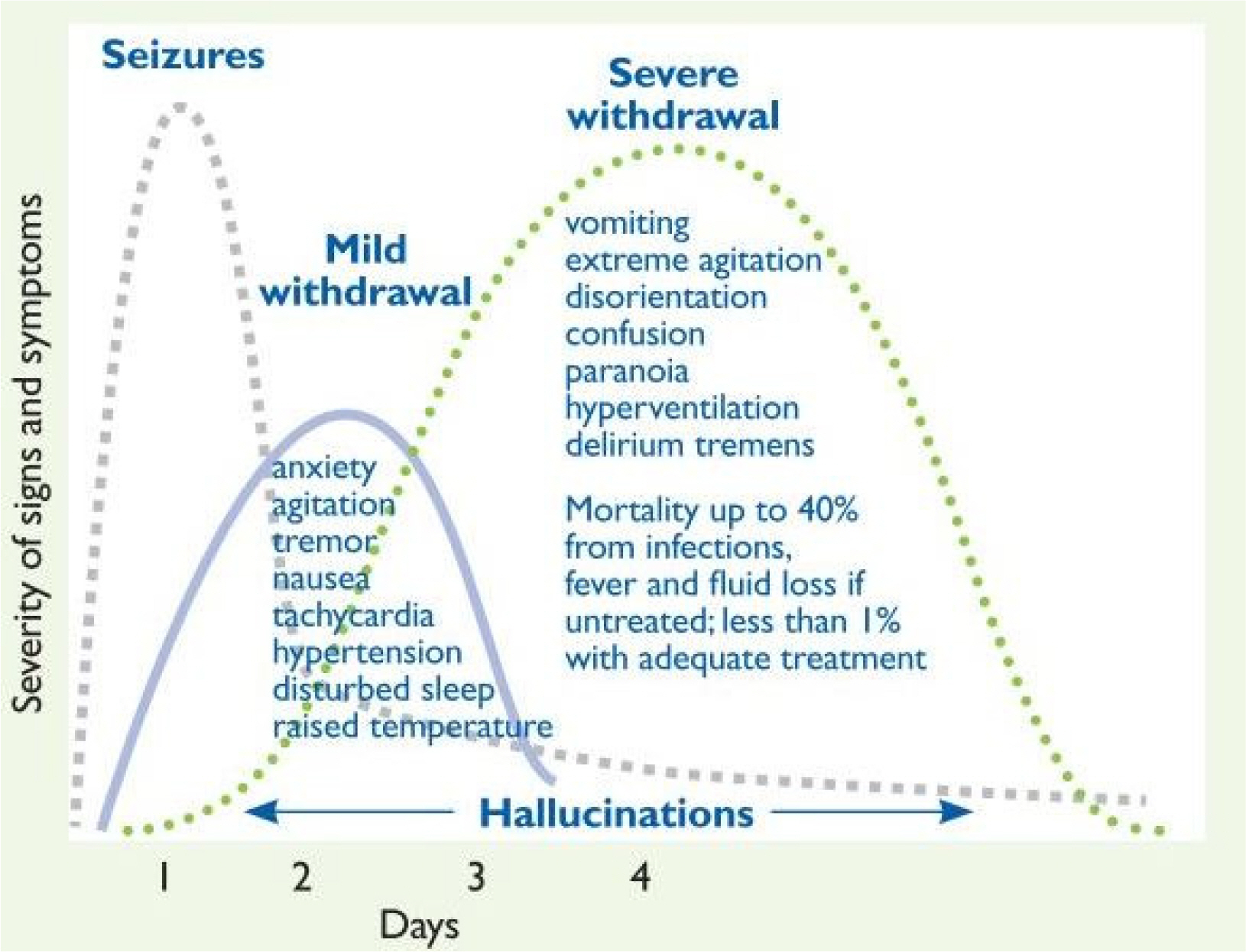Korean J Gastroenterol.
2020 Aug;76(2):71-77. 10.4166/kjg.2020.76.2.71.
Assessment and Treatment of Alcohol Withdrawal Syndrome
- Affiliations
-
- 1Department of Psychology Graduate School, Kangwon National University, Chuncheon, Korea
- 2Chuncheon Community Addiction Management Center, Chuncheon, Korea
- 3Department of Psychiatry, Konkuk University Chungju Hospital, Chungju, Korea
- 4Department of Psychiatry, Hallym University Chuncheon Sacred Heart Hospital, Chuncheon, Korea
- KMID: 2505812
- DOI: http://doi.org/10.4166/kjg.2020.76.2.71
Abstract
- Alcohol withdrawal syndrome (AWS) is the most common and well-known condition occurring after intentional or unintentionalcessation or decreasing heavy drinking. Approximately 5-10% of these people are suffering from serious medical and psychiatricproblems, withdrawal seizures, perceptual disturbances, and delirium tremens. Despite acute medical conditions with the highmortality of severe AWS, proper management could decrease the severity and mortality of AWS. The Clinical Institute withdrawalassessment for alcohol-revised version is a valid, reliable, and sensitive instrument for assessing the clinical course and thetreatment monitoring of alcohol withdrawal. Benzodiazepine is the pharmacotherapy of choice for alcohol withdrawal. Diazepamor lorazepam treatment is best initiated early in the course of alcohol withdrawal to prevent progression to more severewithdrawal. There are three strategies for the pharmacotherapy of AWS. After the treatment of AWS, most patients should bemanaged or treated by the continuing care, including the psychosocial treatments, community-based management, and programsfor preventing recurrence of AWS.
Figure
Reference
-
1. 2017. Apr. 13. The survey of mental disorders in Korea. [Internet]. Ministry of Health and Welfare;Seoul (KR): Available from: http://www.mohw.go.kr/upload/viewer/skin/doc.html?.fn=1493191278238_20170426162121.pdf&rs=/upload/viewer/result/202008/. cited 2020 Jul 20.2. Mainerova B, Prasko J, Latalova K, et al. 2015; Alcohol withdrawal delirium - diagnosis, course and treatment. Biomed Pap Med Fac Univ Palacky Olomouc Czech Repub. 159:44–52. DOI: 10.5507/bp.2013.089. PMID: 24399242.
Article3. American Psychiatric Association. 2013. Diagnostic and statistical manual of mental disorders (DSM-5®). American Psychiatric Pub;Washington (DC): DOI: 10.1176/appi.books.9780890425596.4. 2011. Addiction Treatment Guidelines Series [Internet]. Korean Academy of Addiction Psychiatry, Ministry of Health & Welfare Alcohol Project Supporting Committee Research Paper;Seoul (KR): Available from: http://www.kwcyber.co.kr/upload/pds/PdsProf_upfile_201510102010211_201501388.pdf. cited 2020 Jul 20.5. Kim HY, Lee HK, Lee KS, Joe KH, Choi SW, Seo JS. 2013; Korean addiction treatment guidelines series (II): Pharmacological treatment of alcohol withdrawal. J Korean Neuropsychiatr Assoc. 52:67–75. DOI: 10.4306/jknpa.2013.52.2.67.
Article6. 2009. Jun. Guidelines for the treatment of alcohol problems. [Internet]. Australian Government Department of Health and Ageing;; Canberra (AU): from https://www.health.gov.au/sites/default/files/guidelines-for-the-treatment-of-alcohol-problems_0.pdf. cited 2020 Jul 20.7. Guthrie SK. 1989; The treatment of alcohol withdrawal. Pharmacotherapy:The Journal of Human Pharmacology and Drug Therapy. 9:131–143. DOI: 10.1002/j.1875-9114.1989.tb04119.x. PMID: 2666958.
Article8. Heo K, Cho YJ, Eun SH, et al. 2017; Management of alcohol withdrawal syndrome and alcohol withdrawal seizure. J Korean Neurol Assoc. 35:121–128. DOI: 10.17340/jkna.2017.3.1.
Article9. The American Psychiatric Association. 2016. The American Psychiatric Association practice guideline on the use of antipsychotics to treat agitation or psychosis in patients with dementia. American Psychiatric Pub;Washington (DC): DOI: 10.1176/appi.books.9780890426807.10. Kim JW, Lee BC, Kang TC, Choi IG. 2013; The current situation of treatment systems for alcoholism in Korea. J Korean Med Sci. 28:181–189. DOI: 10.3346/jkms.2013.28.2.181. PMID: 23400047. PMCID: PMC3565127.
Article11. Kim SK, Kim SK, Kim YT, Jung WY. Hahn JH, editor. 2019. Alcohol addiction. Addiction psychiatry. 2nd ed. Imis;Seoul:12. Long D, Long B, Koyfman A. 2017; The emergency medicine management of severe alcohol withdrawal. Am J Emerg Med. 35:1005–1011. DOI: 10.1016/j.ajem.2017.02.002. PMID: 28188055.
Article13. Lange-Asschenfeldt C, Müller MJ, Szegedi A, Anghelescu I, Klawe C, Wetzel H. 2003; Symptom-triggered versus standard chlormethiazole treatment of inpatient alcohol withdrawal: clinical implications from a chart analysis. Eur Addict Res. 9:1–7. DOI: 10.1159/000067729. PMID: 12566792.
Article14. Daeppen JB, Gache P, Landry U, et al. 2002; Symptom-triggered vs fixed-schedule doses of benzodiazepine for alcohol withdrawal:a randomized treatment trial. Arch Intern Med. 162:1117–1121. DOI: 10.1001/archinte.162.10.1117. PMID: 12020181.15. Ismail MF, Doherty K, Bradshaw P, O'Sullivan I, Cassidy EM. 2019; Symptom-triggered therapy for assessment and management of alcohol withdrawal syndrome in the emergency department short-stay clinical decision unit. Emerg Med J. 36:18–21. DOI: 10.1136/emermed-2017-206997. PMID: 30282630.
Article16. G NG. 2004; Pharmacotherapy of alcohol use disorders. Journal of Korean Neuropsychiatric Association. 43:652–658. DOI: 10.1080/10826080500294890.17. Lee BH, Kim HS, Seo JS, et al. 2013; Korean addiction treatment guidelines series (I) : development of Korean guidelines for the treatment of alcohol use disorder. J Korean Neuropsychiatr Assoc. 52:263–271. DOI: 10.4306/jknpa.2013.52.4.263.18. Gi SW. 2004; Recent psychosocial therapeutic approach on alcohol dependence. Journal of Korean Neuropsychiatric Association. 43:646–651.19. Hettema J, Steele J, Miller WR. 2005; Motivational interviewing. Annu Rev Clin Psychol. 1:91–111. DOI: 10.1146/annurev.clinpsy.1.102803.143833. PMID: 17716083.
Article20. Miller WR, Rollnick S. 2002. Motivational interviewing: preparing people for change. 2nd ed. Guilford Press;New York: DOI: 10.1097/01445442-200305000-00013.21. Nowinski J, Baker S, Carroll KM. 1992. Twelve step facilitation therapy manual: a clinical research guide for therapists treating individuals with alcohol abuse and dependence. Diane Publishing Company;Pennsylvania:
- Full Text Links
- Actions
-
Cited
- CITED
-
- Close
- Share
- Similar articles
-
- Choreiform Dyskinesia as a Sole Manifestation of Alcohol Withdrawal Syndrome
- Management of Alcohol Withdrawal Syndrome and Alcohol Withdrawal Seizure
- Prognosis and Clinical Outcome of Alcohol Withdrawal Syndrome in Trauma Patients
- The Relationship of Alcohol Withdrawal Delirium and Alcohol Withdrawal Symptoms in Patients with Alcohol Dependence
- Relationship between Alcohol Withdrawal Symptoms and Dopaminergic Gene Polymorphisms(DRD2, DAT, COMT) in Alcohol Dependence Patients


